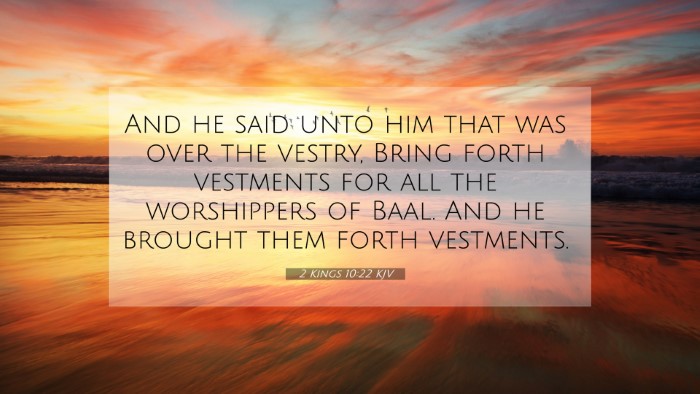Analysis of 2 Kings 10:22
Verse Reference: 2 Kings 10:22
Verse Text: "And he said unto the steward of his house, Bring forth the vestments for all the worshippers of Baal. And he brought forth the vestments unto them."
Contextual Understanding
This verse is pivotal in the narrative of zealous reform and divine judgment executed by Jehu, the newly appointed king of Israel. Jehu's mission was to eradicate the worship of Baal from Israel, which highlights the ongoing theological conflict between Yahweh and the worship of false gods.
Commentary Insights
-
Matthew Henry's Commentary:
Henry emphasizes Jehu’s decisive actions to confront and eliminate idol worship from the nation. He notes the symbolic significance of the 'vestments' which represent the clothing of worshippers and the formalities surrounding false worship. Jehu's command was intended to mock and dismantle the corrupt practices associated with Baal worship.
-
Albert Barnes' Notes:
Barnes points out that Jehu was keen to ensure that those who worshipped Baal were dressed appropriately, likely to make a spectacle of their loathsome practices. This is significant as it shows Jehu's strategic approach to engaging with Baal worshippers, highlighting the absurdity of their rituals.
-
Adam Clarke's Commentary:
Clarke dives deeper into the historical context by explaining the severity of Baal worship and its implications on Israel. He suggests that by commanding the vestments to be brought forth, Jehu aimed to publicly demonstrate the futility of Baal worship, preparing for a significant purging of idolatry. This reflects the importance of public demonstration in asserting God's sovereignty.
Thematic Connections
This verse resonates with several themes throughout the Bible concerning idolatry, divine judgment, and covenant faithfulness. Understanding these themes can enhance one’s scriptural cross-referencing for deeper insights.
Related Bible Verse Cross-References
- 1 Kings 18:17-40: The contest between Elijah and the prophets of Baal, showcasing God's superiority.
- 2 Kings 9:10: God's judgment against the house of Ahab for idolatry and bloodshed.
- Hosea 2:16-17: Israel's call to return to God, reflecting the futility of idolatry.
- Isaiah 46:1-2: The impotence of idols, reinforcing that they cannot save or provide.
- Jeremiah 11:13: God's indictment of Israel for worshipping multiple gods.
- 1 Chronicles 10:13-14: The demise of Saul due to unfaithfulness, paralleling the worship of false gods.
- Ezekiel 14:6: A call for Israel to repent from their idols, reinforcing Jehu’s mission.
Inter-Biblical Dialogue
The act of commanding the vestments of Baal worshippers illustrates a critical dialogue between the Old Testament’s narratives and themes found in the New Testament. The judgment against idolatry in ancient Israel is echoed in the early Christian teachings against the worship of false gods, as seen in Colossians 3:5, where believers are reminded to "put to death" what is earthly in them.
Understanding through Cross-Referencing
For those studying the connections between these verses and the bigger narrative of Scripture, employing tools for Bible cross-referencing can be invaluable. Here are approaches to effectively utilize these tools:
- Bible Concordance: Use this to locate other mentions of Baal and idol worship throughout the texts.
- Bible Cross-reference Guide: Follow thematic threads such as idolatry through different books.
- Cross-referencing Bible Study: Compare narratives showing God’s faithfulness against Israel’s unfaithfulness.
Conclusion
2 Kings 10:22 serves as a stark reminder of the consequences of idolatry and the clear call for covenant faithfulness. By linking various scriptures, one can see the unified message of reliance on God throughout the Bible.




